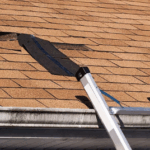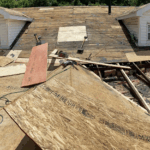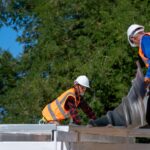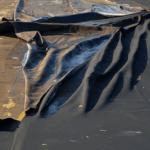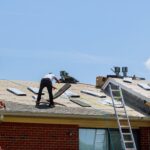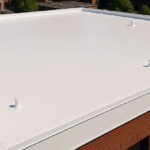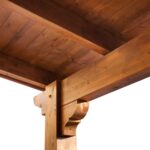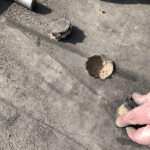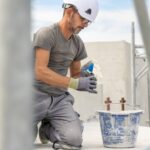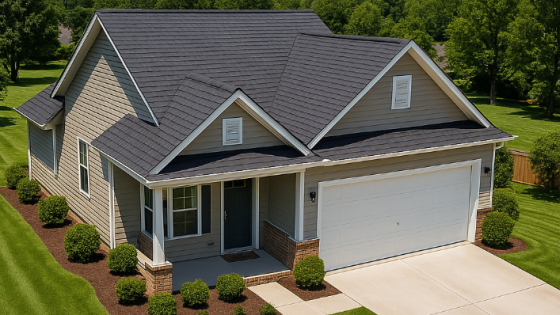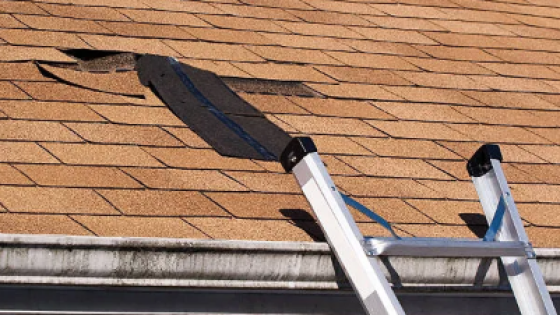When it comes to building efficiency, energy savings, and long-term roof performance, insulation plays a critical role—especially for commercial properties. Choosing the best material for commercial roof insulation isn’t just about upfront cost; it’s about durability, thermal performance, and environmental impact. Whether you’re planning a new construction or retrofitting an aging roof, understanding your insulation options can make or break the long-term efficiency of your building.
In this article, we’ll explore the top materials used in commercial roofing insulation, backed by government data and building science research, and help you determine what’s right for your specific needs.
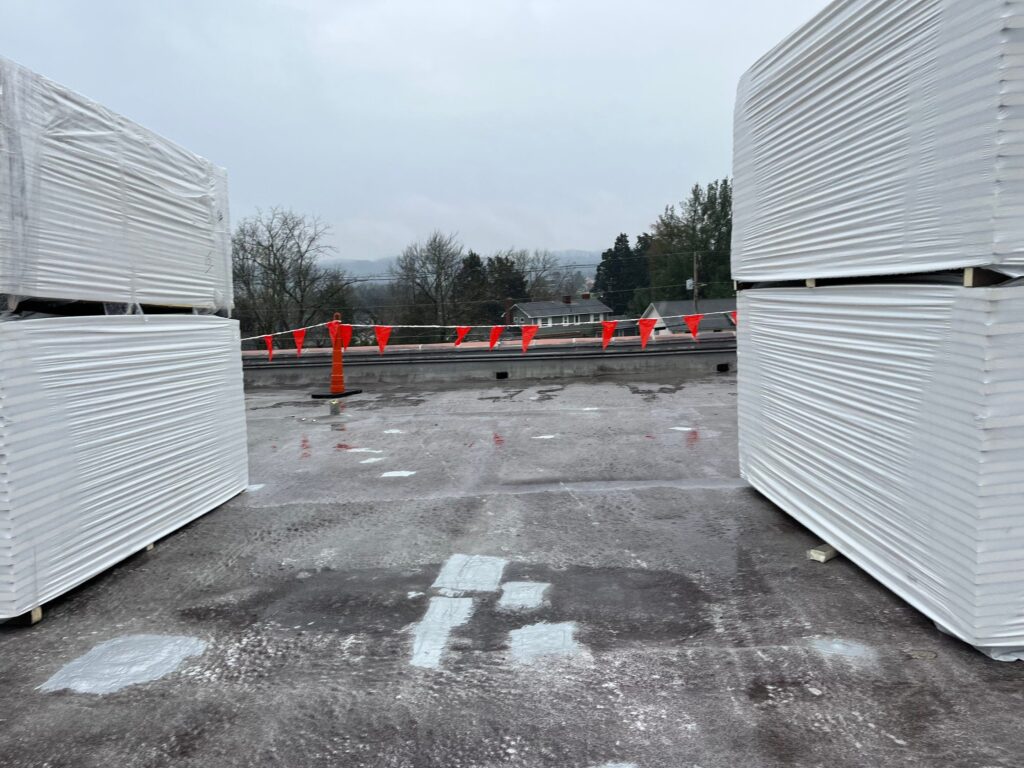
Key Takeaways
💡Polyisocyanurate (Polyiso) offers the highest R-value per inch and is widely used in commercial flat roofing.
💡Expanded Polystyrene (EPS) is cost-effective and moisture-resistant, ideal for certain low-slope roof applications.
💡Extruded Polystyrene (XPS) balances R-value and moisture resistance, commonly used in re-roofing.
💡Spray Foam (SPF) provides seamless insulation and air sealing but may cost more up front.
Why Insulation Matters for Commercial Roofs
According to the U.S. Department of Energy (DOE), commercial buildings account for roughly 35% of electricity consumption in the U.S., and roof insulation can reduce energy usage by up to 15–25% depending on building type and climate zone (energy.gov).
A poorly insulated roof leads to energy waste, temperature inconsistency, HVAC strain, and ultimately, higher utility bills. With energy codes tightening under the International Energy Conservation Code (IECC) and ASHRAE 90.1, commercial building owners must prioritize proper insulation to remain compliant and efficient.
The Top 4 Materials for Commercial Roof Insulation
1. Polyisocyanurate (Polyiso)
Polyiso is the most common material used in low-slope commercial roofing, especially with single-ply membranes like TPO and EPDM.
- R-value: ~5.6 to 6.5 per inch (highest among rigid boards)
- Cost: Moderate to High
- Moisture Resistance: Moderate
- Recyclability: High
Why it’s often the best material for commercial roof insulation:
- Offers high thermal resistance
- Lightweight and easy to install
- Compatible with most roofing membranes
- Can help meet or exceed local energy code requirements
According to the National Roofing Contractors Association (NRCA), Polyiso dominates commercial roofing due to its high performance-to-cost ratio.
2. Expanded Polystyrene (EPS)
EPS is a closed-cell foam insulation known for its affordability and versatility.
- R-value: ~3.6 to 4.2 per inch
- Cost: Low
- Moisture Resistance: High
- Recyclability: High
EPS is ideal for use under low-slope roof systems or tapered roofing applications. While it doesn’t have as high an R-value as Polyiso, it retains its thermal properties better over time, making it a long-term investment.
3. Extruded Polystyrene (XPS)
XPS falls between EPS and Polyiso in terms of cost and thermal efficiency. It’s often used in protected membrane roof systems and re-roofing projects.
- R-value: ~5.0 per inch
- Cost: Moderate
- Moisture Resistance: Very High
- Recyclability: Moderate
XPS is more resistant to water absorption than Polyiso, making it suitable for roofs prone to ponding or high humidity. According to the EPA’s ENERGY STAR® recommendations, moisture control is key to maintaining long-term insulation value—an area where XPS performs well.
4. Spray Polyurethane Foam (SPF)
SPF is a two-component liquid that expands into a seamless insulation layer when applied. It’s both insulation and air barrier in one.
- R-value: ~6.0 to 6.5 per inch
- Cost: High
- Moisture Resistance: Excellent (if coated properly)
- Recyclability: Low
SPF is especially effective for roofs with complex shapes, penetrations, or retrofit needs. It can adhere to most substrates and is ideal for energy retrofits. According to the U.S. Department of Energy, SPF can reduce air leakage by up to 85%—a major factor in commercial HVAC savings.
Comparing the Best Material for Commercial Roof by Key Factors
| Material | R-Value per Inch | Moisture Resistance | Cost | Best For |
|---|---|---|---|---|
| Polyiso | 5.6 – 6.5 | Moderate | Moderate | General commercial applications |
| EPS | 3.6 – 4.2 | High | Low | Budget-conscious and tapered systems |
| XPS | ~5.0 | Very High | Moderate | Moisture-prone roofs, re-roofing |
| SPF | 6.0 – 6.5 | Excellent | High | Seamless retrofits, air-sealing |
Government Guidelines and Code Compliance
According to the International Energy Conservation Code (IECC), the required R-value for commercial roof insulation varies by climate zone. Knoxville, TN falls into Climate Zone 4A, which generally mandates:
- Minimum R-25 for continuous insulation on low-slope commercial roofs
- Higher R-values for buildings with controlled environments or green certifications (LEED, ENERGY STAR)
ASHRAE Standard 90.1 also offers detailed requirements based on roofing assemblies. Failure to meet these standards may result in code violations, increased insurance premiums, or failed inspections.
Factors to Consider When Choosing the Best Material for Commercial Roof
- Climate and Moisture Exposure
- Areas with frequent rainfall or humidity (like Tennessee) may require higher moisture resistance.
- Areas with frequent rainfall or humidity (like Tennessee) may require higher moisture resistance.
- Roofing System Compatibility
- Some materials work better with TPO, EPDM, or built-up roofing systems. Polyiso is widely compatible.
- Some materials work better with TPO, EPDM, or built-up roofing systems. Polyiso is widely compatible.
- Energy Efficiency Goals
- The higher the R-value, the better the thermal performance. But diminishing returns may apply beyond R-30.
- The higher the R-value, the better the thermal performance. But diminishing returns may apply beyond R-30.
- Installation Type
- Are you replacing the roof or installing over existing layers? Spray foam may be best for retrofits.
- Are you replacing the roof or installing over existing layers? Spray foam may be best for retrofits.
- Budget Constraints
- EPS may be more cost-effective for large square footage but has a lower R-value.
Why Litespeed Construction Is the Right Choice
At Litespeed Construction, Knoxville’s trusted commercial roofing experts, we know that choosing the best material for commercial roof insulation isn’t a one-size-fits-all decision. Our certified team evaluates each project’s size, structure, energy goals, and climate exposure before recommending the ideal insulation system.
Whether you’re building a new facility, retrofitting an aging roof, or aiming for energy certification, our tailored approach ensures your roof system delivers performance and value for decades.
The Best Material for Commercial Roof Projects Depends on Your Goals
The truth is, there is no single “best material for commercial roof insulation”—only the best material for your building’s specific needs. While Polyiso leads in R-value and usage, EPS, XPS, and SPF each offer unique advantages for cost, moisture resistance, or retrofit capability.
Want expert guidance tailored to your building? Call Litespeed Construction today for a free consultation and get the insulation solution that maximizes your investment and energy savings.
Make the Smart Choice for Your Commercial Roof
Selecting the best material for commercial roof insulation is a crucial decision that affects your building’s energy performance, long-term costs, and structural integrity. From industry-leading options like Polyiso and XPS to seamless solutions like spray foam, your choice should reflect your building’s unique needs, local climate, and future goals. But you don’t have to make that decision alone.
Litespeed Construction is Knoxville’s trusted expert in commercial roofing systems. We’ll assess your property, explain your options, and deliver a high-performance roofing solution tailored to your business. Whether you need a full roof replacement, targeted repairs, or code-compliant insulation upgrades, we’re ready to help.
📞 Call Litespeed Construction today at (865) 297-3286 or visit our contact form to schedule your free commercial roofing consultation. Let’s build a better roof—together.




